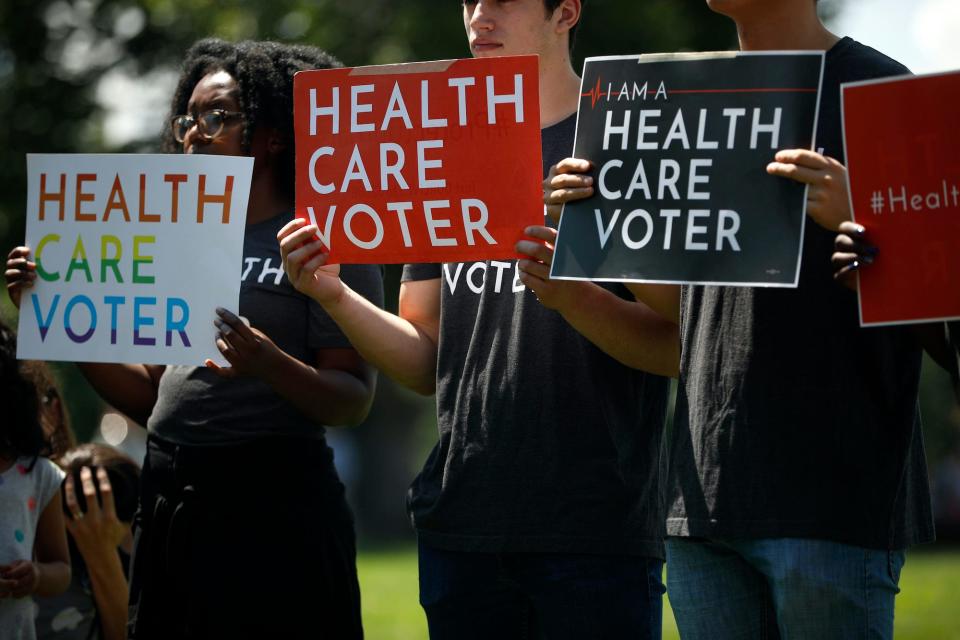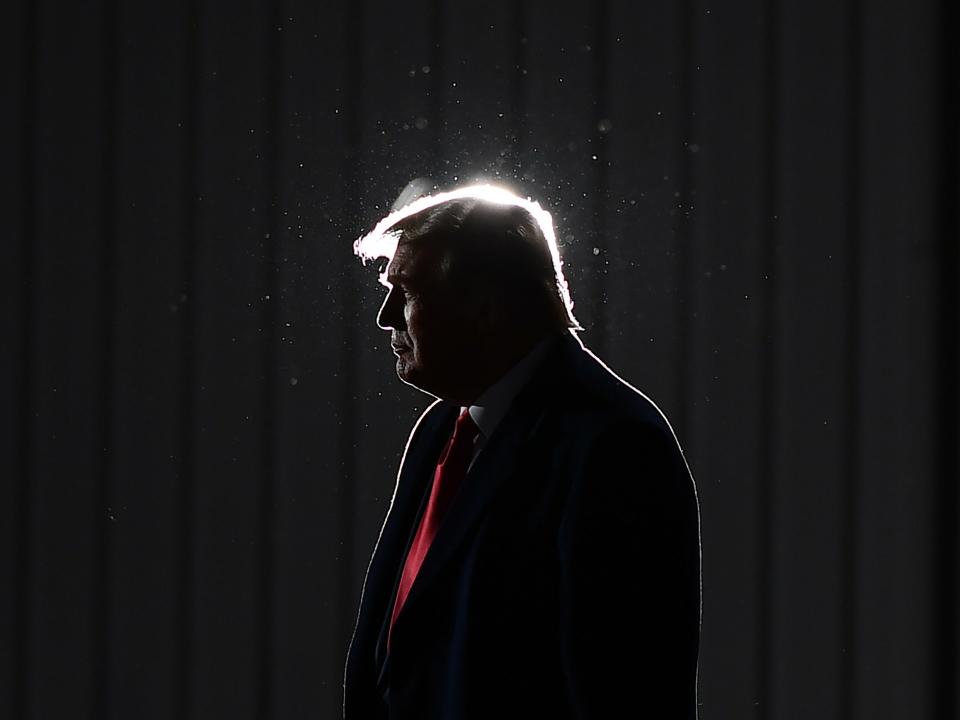What is Trump's healthcare plan? It looks a lot like Obamacare.

For years, Republicans have lambasted Obamacare, and promised that a full replacement for the Affordable Care Act is in the works.
But more than 10 years after the ACA was signed into law, no major GOP replacement plan has surfaced.
Trump's administration has instituted incremental changes to the landmark healthcare law, and zeroed out the universal coverage mandate.
Evidence suggests he would do more of the same if given a second term, largely leaving the ACA alone.
Biden, if elected, would likely usher in a different set of tweaks to the law: he's floated the ideas of a public option, and more health insurance tax credits available to middle- and upper-class Americans on ACA plans.
President Trump talks a lot about getting rid of President Obama's landmark Affordable Care Act, which has extended health insurance to 20 million more Americans.
He often says he'll be replacing that 2010 law with "something terrific" and/or "something great."
But the truth is that Trump and Republicans in Congress haven't unified behind replacing Obamacare at all.
Trump's domestic policy chief Brooke Rollins recently told Business Insider that a backup for the ACA is still "being worked on."
Ezekiel Emanuel, a health policy expert who was an architect of the original ACA in the Obama administration, is skeptical that any major Republican changes to his legislation are truly in the works.
"They've had 10, almost 11 years now, after passage of the Affordable Care Act to put in place an alternative, and they haven't done it," Emanuel told Insider. "They don't have a plan."
Perhaps that's because Republicans don't really want to get rid of the whole ACA.

"They would have done that in 2017 if that's what they wanted to do," Greg Fann, a consulting actuary with Axene Health Partners, and a risk expert who understands the delicate intricacies of the ACA, told Insider. "There's not Republican urgency or appetite to overturn the ACA, unless the court does something drastic."
That could still happen, under a Trump administration lawsuit headed to the Supreme Court next month. But legal experts (even some who've recently worked for Trump) told Business Insider that it's pretty unlikely the ACA will ever get scrapped entirely, especially because Republicans have had a hard time articulating why, exactly, they want to repeal it all.
In fact, Obamacare is getting more popular under Trump, not less. And the law, despite public perception, isn't just about insuring the formerly uninsured; the 900-plus page piece of legislation has also touched many other parts of the American healthcare system.
The ACA has allowed young people to stay on their parents' health plans until age 26. It reduced what seniors pay for prescription drugs, and it allowed the government to test healthcare programs that lower costs and improve care.
For people with pre-existing conditions, the ACA says insurance companies cannot turn away sick people or charge them more for coverage than they charge healthy customers. These protections are something that Trump has promised will remain in place, even if the law is repealed, but he hasn't said how. Past GOP plans haven't maintained the protections, either. For instance, under a Republican bill that failed in 2017, states would have had the power to let insurers opt out of protections.
Given all this, perhaps the better question is: what are the changes that Trump does want to make to the Affordable Care Act, and, how might those changes differ from what a President Biden could do in the next four years?
Here are the basics of what we know so far.
Trump's changes to Obamacare would likely be quite minor in a second term

To get an idea for what Trump might do next, it's worth looking at how his administration has already changed the ACA since he took office.
In 2017, Trump and Republicans in Congress zeroed out the Obama-era mandate on coverage, allowing Americans to once again go insurance-free, without risking penalties. Many Democrats lamented the move, arguing it would make the health insurance marketplace more unstable, by taking more healthy people out of the system. But the truth is that ACA coverage was already unaffordable for many people making over $50,000 (who generally don't qualify for subsidies).
"The ACA was more focused on sicker and lower income populations, and trying to really provide care for underserved populations," Fann said.
The Trump administration has also allowed more people to buy insurance that falls outside of the ACA's original rules. For instance, people are allowed to sign up for short-term health insurance plans, which don't have to cover people with pre-existing conditions. The plans have been derided by Democrats as "junk insurance," but Trump officials say they give some level of coverage to people who can't afford ACA plans, who would otherwise be uninsured.
"I would say the Republican plan is more of broader tax credits, trying to attract more people," Fann said.
He says there's fresh evidence, in the form of a new federal report out this week, detailing both the declining cost of health insurance premiums for young people under the ACA, and insurer participation rates going up, that Trump's changes are working.
"Insurers are coming back to the market, premiums are declining," he said.
Fann says one of the best courses of action that Trump could take, if reelected, would be to essentially do nothing for a while, and let the market mature. Indeed, Trump's campaign webpage dedicated to healthcare seems more focused on listing his achievements thus far, rather than promising anything new. Similarly, the White House's "America First Healthcare Plan" reads more like a laundry list of incremental changes to the ACA to date.
"If we leave the ACA alone, it's going to continue to get better," Fann said. "Let's just leave this thing alone until we understand what's going on."
How does it compare to Biden's healthcare plan?

If Biden wins, there will be a different, and seemingly bolder set of priorities for reshaping the ACA.
The possibility of a public option (something somewhat like Medicare, but available to all Americans under 65) is one of the biggest differences between his plan and Trump's.
The Biden campaign also says it will eliminate the cap on ACA insurance subsidies, so that people making more than 400% of the federal poverty level ($50,000 for a single person) qualify for tax credits.
"You're going to see a big push in trying to make it more affordable," Emanuel said.
Another campaign promise from the Biden team: lowering the cap on how much coverage in the ACA marketplace can cost, from 9.86% of a person's income to 8.5%.
Regardless of who wins the election, it's going to take a lot longer than four more years for this healthcare law to mature.
Just look at how many times Social Security's been reformed and tweaked, since it was enacted by President Roosevelt in 1935. Or the changes that have been brought to the Medicare and Medicaid systems, since they were signed into law by President Johnson in 1965.
President Obama's Affordable Care Act has joined this cannon of sweeping reforms. As such, it will take decades to refine, through many more presidents, and many more sessions of Congress. Despite what you might've heard about "repeal" or "replace," improving it will take more continuous, measured improvement of the system than any one President alone can provide.
Read the original article on Business Insider

